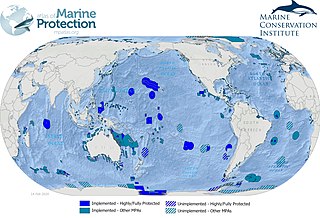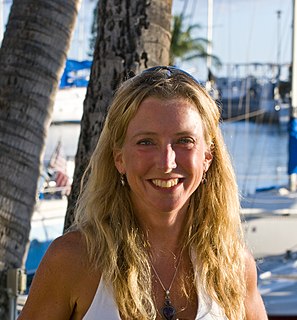
Marine biology is the scientific study of the biology of marine life, organisms in the sea. Given that in biology many phyla, families and genera have some species that live in the sea and others that live on land, marine biology classifies species based on the environment rather than on taxonomy.

Sylvia Alice Earle is an American marine biologist, oceanographer, explorer, author, and lecturer. She has been a National Geographic explorer-in-residence since 1998. Earle was the first female chief scientist of the U.S. National Oceanic and Atmospheric Administration, and was named by Time Magazine as its first Hero for the Planet in 1998.
The pelagic zone consists of the water column of the open ocean, and can be further divided into regions by depth. The word pelagic is derived from Ancient Greek πέλαγος (pélagos) 'open sea'. The pelagic zone can be thought of as an imaginary cylinder or water column between the surface of the sea and the bottom. Conditions in the water column change with depth: pressure increases; temperature and light decrease; salinity, oxygen, micronutrients all change.
David Helvarg is an American journalist and environmental activist. He is the founder and president of the marine conservation lobbying organization Blue Frontier Campaign, a part of the Seaweed rebellion, which arose from his second book Blue Frontier. His first book, The War against the Greens, puts a case that violent organized resistance is being orchestrated against the environmental movement.
The Seaweed Rebellion is an informal marine environmentalist activist movement in the United States. Deriving its name from an analogy with grassroots democracy, the movement comprises disparate organizations with the common aim of protecting the oceans, seas and coasts of the United States.

Marine protected areas (MPA) are protected areas of seas, oceans, estuaries or in the US, the Great Lakes. These marine areas can come in many forms ranging from wildlife refuges to research facilities. MPAs restrict human activity for a conservation purpose, typically to protect natural or cultural resources. Such marine resources are protected by local, state, territorial, native, regional, national, or international authorities and differ substantially among and between nations. This variation includes different limitations on development, fishing practices, fishing seasons and catch limits, moorings and bans on removing or disrupting marine life. In some situations, MPAs also provide revenue for countries, potentially equal to the income that they would have if they were to grant companies permissions to fish. The value of MPA to mobile species is unknown.

Wildcoast is an international non-profit environmental organization that conserves coastal and marine ecosystems and wildlife.

An aquatic ecosystem is an ecosystem formed by surrounding a body of water, in contrast to land-based terrestrial ecosystems. Aquatic ecosystems contain communities of organisms that are dependent on each other and on their environment. The two main types of aquatic ecosystems are marine ecosystems and freshwater ecosystems. Freshwater ecosystems may be lentic ; lotic ; and wetlands.

Marine conservation, also known as ocean conservation, is the protection and preservation of ecosystems in oceans and seas through planned management in order to prevent the over-exploitation of these marine resources. Marine conservation is informed by the study of marine plants and animal resources and ecosystem functions and is driven by response to the manifested negative effects seen in the environment such as species loss, habitat degradation and changes in ecosystem functions and focuses on limiting human-caused damage to marine ecosystems, restoring damaged marine ecosystems, and preserving vulnerable species and ecosystems of the marine life. Marine conservation is a relatively new discipline which has developed as a response to biological issues such as extinction and marine habitats change.

Rosalind Savage MBE FRGS is an English ocean rower, environmental advocate, writer and speaker.

Marine conservation activism is the efforts of non-governmental organizations and individuals to bring about social and political change in the area of marine conservation. Marine conservation is properly conceived as a set of management strategies for the protection and preservation of ecosystems in oceans and seas. Activists raise public awareness and support for conservation, while pushing governments and corporations to practice sound ocean management, create conservation policy, and enforce existing laws and policy through effective regulation. There are many different kinds of organizations and agencies that work toward these common goals. They all are a part of the growing movement that is ocean conservation. These organizations fight for many causes including stopping pollution, overfishing, whaling and by-catching, and supporting marine protected areas.

James Patrick Toomey is an American cartoonist famous for his comic Sherman's Lagoon. Toomey received his B.S.E. from Duke University's Pratt School of Engineering in 1983, an M.L.A. from Stanford University in 1995, and a Master's of Environmental Management from the Nicholas School of the Environment and Earth Sciences in 2008.

Seaweed, or macroalgae, refers to thousands of species of macroscopic, multicellular, marine algae. The term includes some types of Rhodophyta (red), Phaeophyta (brown) and Chlorophyta (green) macroalgae. Seaweed species such as kelps provide essential nursery habitat for fisheries and other marine species and thus protect food sources; other species, such as planktonic algae, play a vital role in capturing carbon, producing at least 50% of Earth's oxygen.

Anti-whaling refers to actions taken by those who seek to end whaling in various forms, whether locally or globally in the pursuit of marine conservation. Such activism is often a response to specific conflicts with pro-whaling countries and organizations that practice commercial whaling and/or research whaling, as well as with indigenous groups engaged in subsistence whaling. Some anti-whaling factions have received criticism and legal action for extreme methods including violent direct action. The term anti-whaling may also be used to describe beliefs and activities related to these actions.

Seaweed farming or kelp farming is the practice of cultivating and harvesting seaweed. In its simplest form, it consists of the management of naturally found batches. In its most advanced form, it consists of fully controlling the life cycle of the algae. The top seven most cultivated seaweed taxa are Eucheuma spp., Kappaphycus alvarezii, Gracilaria spp., Saccharina japonica, Undaria pinnatifida, Pyropia spp., and Sargassum fusiforme. Eucheuma and K. alvarezii are farmed for carrageenan ; Gracilaria is farmed for agar; while the rest are farmed for food. The largest seaweed-producing countries are China, Indonesia, and the Philippines. Other notable producers include South Korea, North Korea, Japan, Malaysia, and Zanzibar (Tanzania). Seaweed farming has frequently been developed as an alternative to improve economic conditions and to reduce fishing pressure and overexploited fisheries.
Blue Ventures is a science-led social enterprise that develops transformative approaches for nurturing and sustaining locally led marine conservation. The organisation works in partnership with coastal communities in places where the ocean is vital to the culture and economy.

Blue Carbon refers to organic carbon that is captured and stored by the world's oceanic and coastal ecosystems, mostly by algae, seagrasses, macroalgae, mangroves, salt marshes and other plants in coastal wetlands. The term Blue Carbon was coined in 2009 to highlight the contribution of coastal vegetated ecosystems to climate change mitigation. Because oceans cover 70% of the planet, there is increasing industry interest in developing Blue Carbon potential. Research is ongoing, and while in some cases it has been found that these types of ecosystems remove far more carbon per area than terrestrial forests, the effectiveness of Blue Carbon as a carbon dioxide removal solution remains highly contested.
Aquaculture in Madagascar started to take off in the 1980s. The industry includes the cultivation of sea cucumbers, seaweed, fish and shrimp and is being used to stimulate the country's economy, increase the wages of fishermen and women, and improve the regions ocean water quality. Coastal regions of Madagascar are reliant on the Indian Ocean's marine resources as a source of food, income, and cultural identity.

Winifred "Wendy" Benchley is a marine and environmental conservation advocate and former councilwoman from New Jersey. She is known for co-founding various environmental organizations and for being the wife of author Peter Benchley.

Marine Permaculture is a form of mariculture that reflects the principles of permaculture by recreating seaweed forest habitat and other ecosystems in nearshore and offshore ocean environments. Doing so enables a sustainable long-term harvest of seaweeds and seafood, while regenerating life in the ocean.














